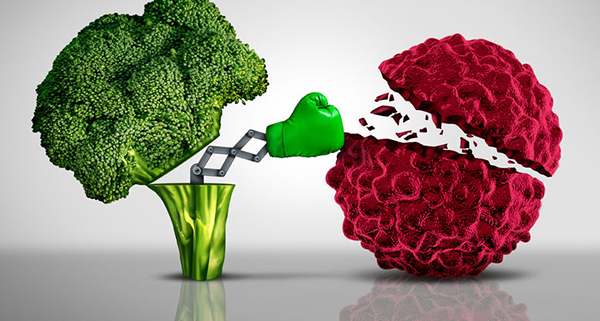Are You Fighting Cancer with Your Lifestyle? 5 Strategies to Keep Cancer at Bay
Cancer is a scary word. Too often, people are swindled into taking handfuls of supplements and other snake oil strategies in an attempt to ward off cancer, when the “cures” often do nothing but drain your bank account and may even be harmful. Although evidence between certain foods and cancer are still up for debate, there are five cancer prevention guidelines based on research from the World Cancer Report that you should consider to reduce your cancer risk.
1) Lose weight. Overweight and obesity are linked to several types of cancer. Intentional weight loss has shown reductions in cancer rates in several studies. One strategy for weight loss is to add one healthy lifestyle change at a time and slowly build up your healthy habits. As you add in more healthy habits, it will be easier to push out unhealthy habits. For example, by setting a goal to drink 8 glasses of water per day, you may naturally find yourself reaching for soda less. Or by adding in fresh produce as snacks twice a day, like celery and hummus or apple slices and peanut butter, you are less tempted to reach for cookies, chips and other junk foods.
2) Be active regularly. Regular exercise helps cancer prevention by helping to protect against unhealthy weight gain. The hormone changes that occur with hitting the gym regularly may also play an important role in preventing cancer and improving survival rates in those with cancer. Researchers recommend at least an hour of moderate physical activity daily, like taking a brisk walk in the evening or riding a bike to and from work.
3) Avoid sugary drinks. Among beverages, soda and juice are two of the biggest trouble makers. They lack much nutrition and because of their high calorie and sugar content, they are directly related to fat gain, diabetes and heart disease. Because of these risks, try to limit or avoid sugary drinks, instead opting for whole fruits instead of juice, and water with lemon instead of soda.
4) Eat less red meat, especially the processed kind. High intake of red meat, especially processed meats like hot dogs, salami, bacon, sausage, have been associated with greater risk of cancer. According to the American Institute for Cancer research, it is best to avoid processed meats completely and limit red meats, like beef, pork, lamb, to 18 ounces per week. This boils down to eating a 3 ounce portion of meat, about the size of a deck of cards, no more than 6 times per week.
5) Fight with phytochemicals. The nutrients in vegetables, fruits and whole grains, specifically the phytochemicals, may reduce risks of some cancers. Different phytochemicals are associated with the naturally occurring colors in foods. For example, carotenoids, a phytochemical that may inhibit cancer cell growth and improve the body’s immune response, are high in foods with red, orange, green and yellow hues, like carrots, tomatoes, and bell peppers. Isoflavones, which may inhibit tumor growth and decrease cancer related hormones in the body, are high in soybeans and soy products like soy milk, tofu and edamame. Isothiocyanates may block tumor growth and are rich in cruciferous vegetables like kale, spinach, Brussel sprouts and broccoli. There are many different phytochemicals and the best way to ensure you are getting a large and variety amount of phytochemicals in your food is to include as many different colored vegetables and fruits as possible, and when eating grains, to make sure they are mostly whole grains.



